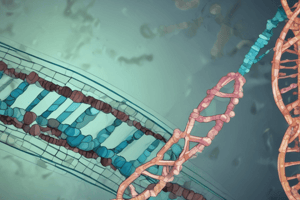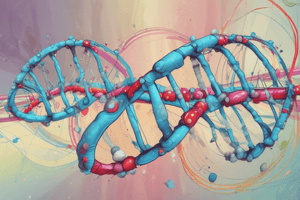Podcast
Questions and Answers
What is the central dogma of molecular biology?
What is the central dogma of molecular biology?
- Genes determine RNA production
- Proteins determine genetic traits
- DNA determines genetic sequences
- Genetic sequences determine protein function (correct)
Which molecule serves as a template for producing RNA in cells?
Which molecule serves as a template for producing RNA in cells?
- Carbohydrates
- Proteins
- DNA (correct)
- Lipids
What do researchers infer by understanding gene sequences and corresponding proteins?
What do researchers infer by understanding gene sequences and corresponding proteins?
- Structural features of lipids
- Mechanism of RNA synthesis
- Evolutionary history of DNA
- Common ancestry among species (correct)
What is the relationship between genes, proteins, and observable features of individuals?
What is the relationship between genes, proteins, and observable features of individuals?
What does the study of genetics focus on in terms of traits transmission?
What does the study of genetics focus on in terms of traits transmission?
Why do researchers compare genomes across diverse species in genetic studies?
Why do researchers compare genomes across diverse species in genetic studies?
What does population genetics focus on?
What does population genetics focus on?
Which field integrates genomic data with health records to predict disease risks?
Which field integrates genomic data with health records to predict disease risks?
What does ecogenomics combine to study genetic variation's influence on ecosystem dynamics?
What does ecogenomics combine to study genetic variation's influence on ecosystem dynamics?
Which field investigates individual differences in drug response due to genetic variation?
Which field investigates individual differences in drug response due to genetic variation?
What is a key ethical issue related to genetics technology mentioned in the text?
What is a key ethical issue related to genetics technology mentioned in the text?
How does medical genetics contribute to healthcare?
How does medical genetics contribute to healthcare?
Flashcards are hidden until you start studying
Study Notes
Genetics: Exploring Life's Building Blocks
Genetics is a foundational aspect of biology that studies the transmission of traits between generations and the variation of organisms over time. It delves into the relationship between genes, proteins, and the physical characteristics of living beings, often referred to as phenotypes. At its heart lies the question of how instructions stored in DNA molecules are translated into functional components of cells and finally manifest themselves as observable features of individuals. Here we explore various facets of genetic study.
From Gene Sequences to Protein Function
The central dogma of molecular biology posits that genetic sequences determine protein function. DNA in cells serves as a template for producing RNA, which in turn acts as a recipe for creating proteins through a process called translation. These proteins are essential for maintaining life processes, from structural roles in cells to catalytic activities in metabolism. By understanding gene sequences and their corresponding proteins, scientists can infer functionality and deduce relationships among organisms.
Unlocking Clues Through Comparison
In studying genetics, researchers frequently compare genomes across diverse species. This comparative approach allows insights into shared ancestry and evolutionary divergence. For instance, comparing human and fruit fly genomes reveals similarities that suggest the existence of common genetic pathways underlying fundamental cellular processes. Such comparisons lay the foundation for understanding how variations in DNA influence developmental outcomes and adaptation to environments.
Population Genetics and Ecogenomics
Population genetics focuses on the distribution of alleles (versions of a single gene) within populations. It provides clues about historical events such as migration patterns, population bottlenecks, and natural selection pressure. Meanwhile, ecogenomics combines principles of population genetics with ecological theory to study how genetic variation influences individual fitness and ultimately ecosystem dynamics.
Realizing the Complexity of Human Health
Medical genetics encompasses several subfields including clinical genetics, medical genomics, and pharmacogenetics. Clinicians diagnose and manage patients with heritable disorders, while medical genomics integrates genomic data with health records to predict disease risks and tailor preventive measures. Pharmacogenetics investigates individual differences in drug response due to genetic variation, enabling personalized treatments for patients.
Ethical Considerations
With significant advancements in genetics technology comes the responsibility to address ethical issues. Topics include privacy concerns surrounding genetic testing, informed consent procedures when participating in research involving gene editing technologies, and the careful consideration required when developing novel therapeutic interventions.
Overall, the realm of genetics covers a vast array of disciplines, ranging from fundamental questions about the building blocks of life to applied aspects impacting our daily lives. As we uncover more about our genetic makeup, we continually expand our knowledge base and heighten our ability to tackle global challenges and enhance human welfare.
Studying That Suits You
Use AI to generate personalized quizzes and flashcards to suit your learning preferences.




